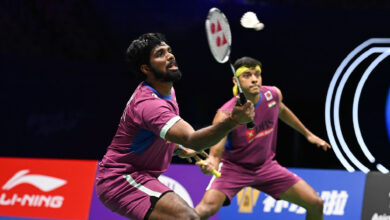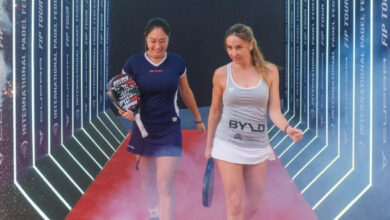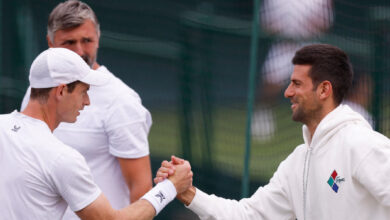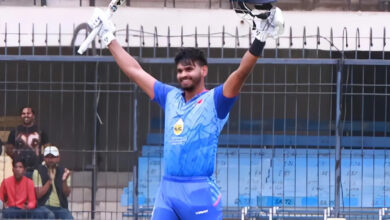Brutal, precise shotmaking, perfect combination of resolute defence and calculated aggression: how Djokovic defeated Alcaraz | Tennis News
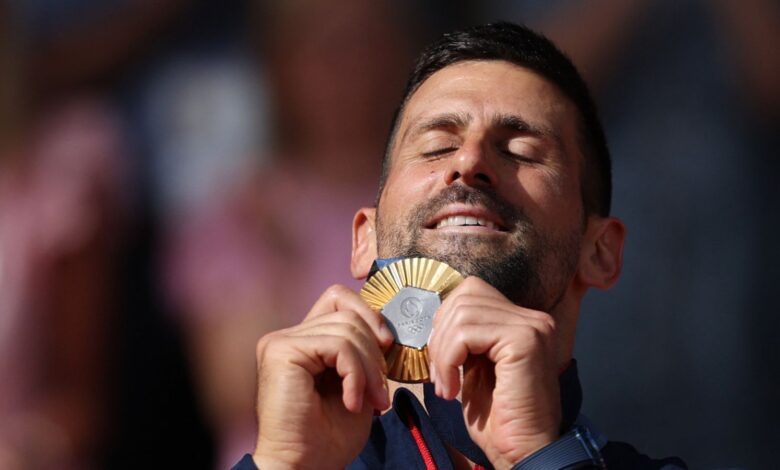
In ‘Serve to Win,’ the autobiography/lifestyle guide/cookbook authored Novak Djokovic in 2013, somewhere in between the chapters in which he gives horrifying accounts of his war-torn upbringing and prescribes eating honey from bees that feed on the Manuka trees of New Zealand, he reveals his favourite proverb. Roughly translated to English, it goes: “When nothing hurts, put a little stone in your shoe and start walking.”
On Sunday, Djokovic completed the set. In a vintage performance of brutal, precise shotmaking and the perfect combination of resolute defence and calculated aggression, he defeated Carlos Alcaraz, the reigning Roland Garros and Wimbledon champion, 7-6 (3), 7-6 (2) to win the gold medal at the Paris Olympics – the one tennis achievement that has evaded a resume that contains 24 Majors, all nine Masters 1000 titles, and triumphs at the ATP Finals and Davis Cup.
As the top seed and most legendary presence on the tour, that may not come as a total surprise. But to put the achievement, given where his tennis has been over the last year, in context; to understand why he defies all convention as a tennis champion, go back to his favourite proverb.
Some time around last year, Djokovic’s shoes became a bit too comfortable. The Serb won three of the four Majors in 2023 and reached all four finals. He ended all debate becoming the outright leader in the all-time Grand Slam leaderboard, winning at least three titles at each of the four tournaments. After reaching the highest of highs, the burning fire began to flicker.
Paris: Novak Djokovic of Serbia in action against Carlos Alcaraz of Spain during the Men Singles gold medal match of the Tennis competitions in the Paris 2024 Olympic Games, at the Roland Garros in Paris, France, 04 August 2024. (EPA-EFE/CAROLINE BLUMBERG VIA PTI)
A few pesky pebbles would make it into his boots over the next six months. After a sluggish start to 2024, recovery from a knee injury, and subsequent surgery, a few weeks prior to Wimbledon may have been a big hurdle, but he responded reaching the final. Humiliation from a 16-years-younger challenger in the summit clash may have fuelled all sorts of uncertainty, but Djokovic found a new source of motivation to thrive on.
Adversity into steel
Few players, if any, have shared Djokovic’s aptitude of turning adversity into steel. The begrudgingly polite Parisian crowds would witness every bit of that aptitude this past week.
On four previous attempts in Beijing, London, Rio, and Tokyo, Djokovic had come close but left with only a single Olympic bronze. Playing to join hory-makers – only Steffi Graf, Andre Agassi, Rafael Nadal and Serena Williams have won the ‘career Golden Slam’ (all four Majors and Olympic gold) – the Serb produced his best tennis in the year gone . With revenge on his mind against the best player in the world, he put up one of the most ruthless, clinical performances he has ever played in a final.
After winning four Majors, including the French Open and Wimbledon back-to-back, Alcaraz’s star has risen at a pace faster than the hefty expectations that have followed him ever since he became a teenaged World No. 1. On Sunday, he was not even mildly off the pace, but on an intense, high-wired afternoon, Djokovic found his very best at the crucial moments, and typically found another gear to go to in the two tiebreakers, to outplay him for the win.
Paris 2024 Olympics – Tennis – Men’s Singles Gold Medal Match – Roland-Garros Stadium, Paris, France – August 04, 2024. Novak Djokovic of Serbia and Carlos Alcaraz of Spain react after their match. (REUTERS/Violeta Santos Moura)
This was an enthralling baseline contest; the first set alone lasted nearly 100 minutes. Unlike the beleaguered straight-sets loss at Wimbledon a month ago, Djokovic went toe-to-toe with Alcaraz from the baseline even when the Spaniard was finding big mileage behind his forehand and moving with speed to cover all corners of the court.
Both players failed to blink – Alcaraz saved five break points and Djokovic saved eight – but it was the mammoth ninth game of the first set in which Djokovic raised his level, saving five break points, and never looked back. As it went to a breaker, Djokovic locked down and Alcaraz let his level fall just enough for the Serb to take advantage.
Neither player let their levels fall too much in the second, even as the Spaniard faced a mountain to climb. A few fascinating, intense exchanges followed and a second breaker ensued in which Alcaraz raised his baseline game only for Djokovic to up the ante further and slap a few huge groundstrokes and see out the win.
Ultimately, the precision of Djokovic’s racquet – the pinpoint T-serves, the lunging forehand winners, the error-free tiebreakers – propelled him to a deserved win.
That same vague parlour debate may be triggered once again, a presumption that it had been put to bed last year itself would have been fair. But finding his best tennis against the best player in the world to win the one title that has eluded him, there could be no louder statement of intent from Djokovic that he still belongs at the top of the pile in men’s tennis – even if he is competing with those closer to his children’s age than his. Especially when hory is on the line.



